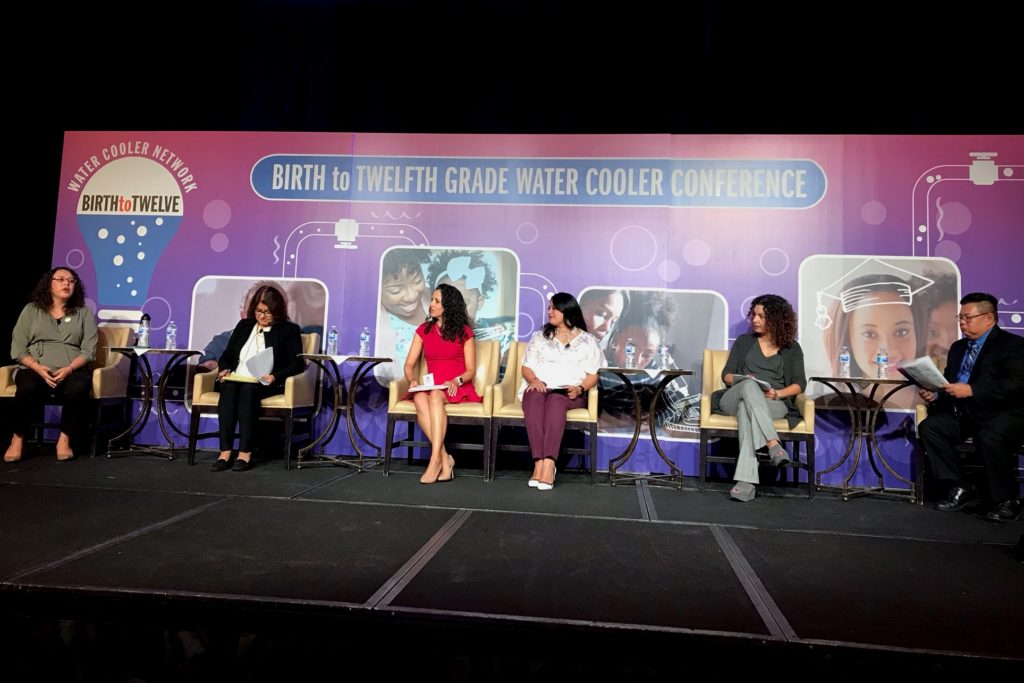Uplifting Dual Language Learners at Advancement Project’s Water Cooler Conference
Early Edge’s Executive Director Patricia Lozano helped lead a powerful dialogue on California’s DLLs during a special panel at the Advancement Project’s recent Birth to Twelfth Grade Water Cooler Conference in Sacramento.
Because California is home to the largest population of dual language learners (DLLs) and English Learners (ELs) in the nation, it is critical that our state advances early learning and care (ELC) policy and practices that recognize and address the unique needs of this large and growing population of children.

The panel, Leading Systemic Change that Brings California’s Diversity to the Center of Quality Early Learning, aimed to elevate the importance of comprehensively building on the assets and incorporating the needs of DLLs and their families as the state engages in strengthening and expanding the ELC system.
During the discussion, Early Edge California and Advancement Project California shared a draft of our co-developed DLL Policy Platform as part of the solution. Grounded in research and developed in collaboration with partners, experts, and stakeholders in the field, the DLL Policy Platform will leverage the new gubernatorial administration’s interest in ELC, to assert that a focus on DLLs is a key component of building a high-quality ECE system in California. Key elements of the Platform include:
- Aligning the ELC system with the California English Learner Roadmap State Policy
- Promoting high-quality ELC programs for DLLs
- Supporting California’s ELC workforce to effectively serve DLLs and their families
Panelists shared why these actions are so critical to the systemic change needed in the ELC system for the future of California’s youngest learners. Panelists also elevated promising practices they have led in their respective roles across the state.
Patricia Lozano spoke about Early Edge’s role in the development of the DLL Policy Platform, while underscoring the important role that California’s ELC Workforce plays in ensuring quality programs for DLLs. She also addressed the 2018 $5 million budget allocation for DLL Professional Development currently being implemented through the California Department of Education’s DLL-PD grant and emphasized the need for more funding to provide DLL training to ELC teachers and administrators across the state. Read more about the key takeaways from this grant.
Other highlights from the panel:
- Dr. Marlene Zepeda, Professor Emeritus, Department of Child and Family Studies, California State University, Los Angeles, shared about her role as a longtime expert and advocate of California DLLs and as lead writer of the DLL Policy Platform. She offered insights and key themes surfacing in this dialogue, particularly around the context of the current opportunities for systemic change in the ELC system with a new governor who is an ELC champion. She also addressed current opportunities to influence the Master Plan for Early Learning and Care and the Cradle to Career longitudinal data system.
- Dr. Dean Tagawa, Executive Director, Early Childhood Division, Los Angeles Unified School District, shared LAUSD’s perspective of the importance of ELC being included in the implementation of the EL Roadmap, and examples of how LAUSD is doing this through their Dual Language Early Learning Pilot program. He also discussed the district’s Birth to Eight Roadmap, a strong example of birth through third grade articulation and alignment.
- Lupe Jaime, Senior Director of Early Care and Education, Fresno County Superintendent of Schools, provided the perspective of a leader implementing a county QRIS and supporting quality and workforce development intentionally focused on DLLs. She shared about her involvement in the Starting Smart and Strong Language Learning Project, the progress and impact they have made thus far, and the importance of including family childcare providers and other nontraditional ELC settings in professional development and statewide quality efforts.
